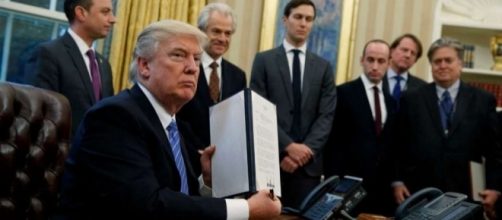Of the executive orders signed by Trump so far, none have been any less controversial than the last, and this week, more executive orders signed by Trump will be targeting immigration. Much has been said about Trump's campaign promise to build a wall along the Mexican border. At the most, Republicans saw targeting sanctuary cities as more of a reality. But now that Donald Trump is the U.S President, he will use his power to sign executive orders to make both promises a reality. As he has announced via Twitter, he said would begin to take action on Wednesday.
President Trump hinted at those executive orders via Twitter, saying would be dealing with national security. A "Washington Post" article says that he would visit the Department of Homeland Security (DHS) in Washington, where he would speak at a town hall of the department's employees. The media service says the "heads up" for his crackdown to protect national security was provided by officials on Tuesday. He is expected to sign the orders at the department. The article also says that officials are confirming that later in the week, he will sign executive orders to ban Muslim refugees from six countries. Along with incoming refugees, people with visas will be affected. It's been noted that many people who reside in the countries targeted by the administration are rarely granted U.S.
visas as it is.
Securing Republican support
The report says that the administration wants to move quickly during the first week after his inauguration to fulfill the promises he's made during his campaign. In order to secure the support of Republicans, President Trump will be attending a congressional GOP retreat in Philadelphia where he will be speaking.
Trump's senior advisors Stephen Bannon and his nominee for attorney general Jeff Sessions were reportedly involved in discussions to ban Muslims and to build a wall along the Mexican border.
It's noted that the Deferred Action for Childhood Arrivals program (DACA) which was put in place in 2012 would likely be targeted as Trump has promised to reverse it.
An official verified this by saying that the details were being worked out. During Jeff Sessions' confirmation hearing, he said that getting rid of the program as what he considered constitutional.
One report by "CNN" says that there are no details as to what kind of action Trump's executive orders will take but reports that many in the administration feel they can use existing laws such as the Bush-era Secure Fence Act. There is no doubt that many are caught off-guard by this news as they never fully felt action against Muslim refugees or immigrants from the Mexican border, would take place. Much of this is due to the "softening" of his campaign's initial language before election day. But on Monday, Press Secretary Sean Spicer said that repealing President Obama's executive actions on immigration were not the priority.
Enacting, challenging the President's executive orders
Meet Fifth Secretary of Homeland Security John F. Kelly: https://t.co/IKJI5yxn8l pic.twitter.com/VylH20PFm1
— Homeland Security (@DHSgov) January 24, 2017
In another hearing with Trump's nominee for Secretary of Homeland Security, who was confirmed on Friday, John F. Kelly said that a border wall would not be built anytime soon. The view that some of Trump's cabinet nominees might clash with the President, has been widely circulated, as many nominees who were asked about supporting many of the President's controversial agendas have expressed views show they might not be as supportive as initially thought.
Verification of this is in reference to the “intense pressure” Kelly is under from the White House, to enforce the President's orders.
He has said before that he promotes tolerance and that people should not be targeted based on their religion. He has also said that as a marine in Iraq, he had reached out to many Muslim leaders. The bans enforced by executive order are said to be temporary. They target refugees from Yemen, Iran, Syria, Iraq, Libya, Sudan and Somalia for 120 days, and the pause of the issuances of visas for 30-days for people from predominantly Muslim countries.

